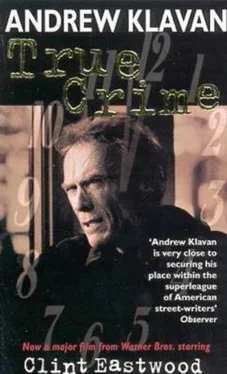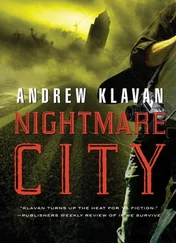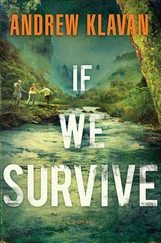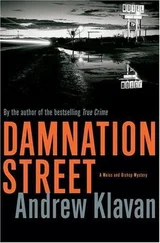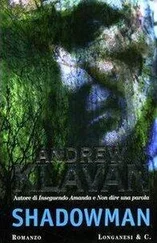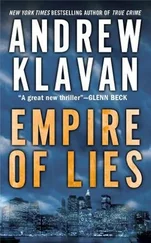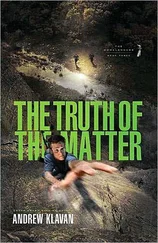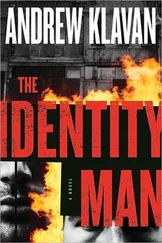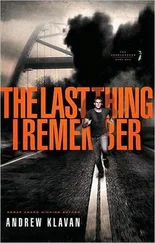Andrew Klavan - True Crime
Здесь есть возможность читать онлайн «Andrew Klavan - True Crime» весь текст электронной книги совершенно бесплатно (целиком полную версию без сокращений). В некоторых случаях можно слушать аудио, скачать через торрент в формате fb2 и присутствует краткое содержание. Жанр: Криминальный детектив, на английском языке. Описание произведения, (предисловие) а так же отзывы посетителей доступны на портале библиотеки ЛибКат.
- Название:True Crime
- Автор:
- Жанр:
- Год:неизвестен
- ISBN:нет данных
- Рейтинг книги:4 / 5. Голосов: 1
-
Избранное:Добавить в избранное
- Отзывы:
-
Ваша оценка:
- 80
- 1
- 2
- 3
- 4
- 5
True Crime: краткое содержание, описание и аннотация
Предлагаем к чтению аннотацию, описание, краткое содержание или предисловие (зависит от того, что написал сам автор книги «True Crime»). Если вы не нашли необходимую информацию о книге — напишите в комментариях, мы постараемся отыскать её.
True Crime — читать онлайн бесплатно полную книгу (весь текст) целиком
Ниже представлен текст книги, разбитый по страницам. Система сохранения места последней прочитанной страницы, позволяет с удобством читать онлайн бесплатно книгу «True Crime», без необходимости каждый раз заново искать на чём Вы остановились. Поставьте закладку, и сможете в любой момент перейти на страницу, на которой закончили чтение.
Интервал:
Закладка:
She was sitting on the cot, as she had been. Very still, her hands folded in her lap now, her head slightly lowered. She was not crying, and her face was quiet. Though the lines of her brow, her cheeks, her mouth, were all drawn down, she wasn’t frowning. They fell as of their own weight and it made her look very old as well. Her eyes looked old when she lifted them to her husband.
“This is more than I can bear,” she said in a low, clear voice. “I thought God wouldn’t send me more than I could bear. But this is more …”
Frank nodded. She lowered her head again, He shuffled to the chair and settled himself into it, gripping the back for support.
“I thought God never sent you more than you could bear,” she said, staring down at the floor. “This is more.”
Frank sat in silence, his eyes wandering, seeing nothing. He wiped his lips with his palm. He let his breath out slowly through pursed lips, like a man recovering from a blow. “It’ll …” His voice failed. He ran his hand across his mouth again. “It’ll be all right,” he said.
Bonnie laughed once, a terrible sound. An expression of annoyance crossed her face. Then she shook her head and looked away from him, looked off into space.
“Maybe the appeal,” she said softly to no one. “Maybe they’ll listen this time. I mean, they can’t just go ahead and murder an innocent man. Maybe …”
“There’s no appeal,” said Frank, his eyes wandering the room.
“… at the last minute, they’ll have to see. I mean, this is still America, for heaven’s sake. Isn’t it? You were just going to the store. I just asked you to go to the store for me. They’re not just going to take a man, a good, decent man …”
“They turned the appeal down, Bonnie.”
“… and execute him. That wouldn’t make any sense. All these technical things they talk about. In the end, don’t you think in the end, maybe they’ll just say …”
Frank straightened himself in the chair, focusing on his wife finally. “Bonnie,” he said quietly.
“… they’ll just flat-out see.”
“Bonnie, for God’s sake.”
“They’ll have to see. It’s not a matter of some-some technical thing. It’s an injustice. An injustice. The lawyers will make them understand …”
“There’s no appeal, Bonnie,” said Frank, his voice rising. “They turned the appeal down.”
“… that they’ve made a terrible …” Bonnie stopped. Her lips moved a moment, as if she would go on, but she didn’t. She closed her eyes.
“That’s what Tryon was calling about before,” Frank said.
Bonnie didn’t answer. She didn’t move. She didn’t open her eyes. Frank watched her. She knew , he thought. Of course she knew .
After that, for a while, they went on as they were, seated where they were, apart from each other, staring off. The clock moved round and they felt the motion of the clock, the burden of its motion, heavy on their backs and in their stomachs. Finally, Frank-unable to stand the loneliness anymore-pushed himself to his feet. He walked the few steps to the cot wearily, and sat down beside his wife. After another moment or two, he put his arm around her. She rested her head on his shoulder.
PART FIVE
1
Oh, ye Tempo of the Gods! You car! You car of cars! I ask you: Is there anything on earth a man can’t accomplish when he and his automobile become one? That drive down to Osage Prison-I tell you, it was the best thing that had happened to me all day. It was the first good thing that had happened to me at all since I had left Patricia. The wind at the windows. The music on the radio. The cigarettes-no end of cigarettes and each one tasting better than the last. And the speed. Mostly the speed. I had less than fifty minutes to make the hour-long drive and, once I climbed onto the highway, I just floored it. And the old bird flew. It took a while to work up to it, I admit. But after that-it flew. Traffic didn’t matter. There was traffic just outside the city, lots of semis rumbling cab to cab like elephants on parade. But it didn’t matter. I went past them, between them, never slowing, going faster, so fast sometimes I felt I must have vaporized and traveled right through the bulk of them, the Tempo’s atoms vibrating between theirs. And the cops didn’t matter. Where were the cops? It was sixty miles of open road; speed traps everywhere-there must have been. But where were they? The cops with their dark glasses, with their radar? They were nowhere to be found. Because they couldn’t see me. That’s why. Their radar guns couldn’t pick me up. They just registered a zip as I went past, just a little green breath of electronic light. Must’ve been the wind , they said to themselves. Must have been dust blowing by in the wind .
I switched on an easy listening station. A secret vice of mine, that music. Like treacle, like warm mushy stew on a windy day. I love it. Andy Williams, yes; Perry Como; Eydie Gorme. I sang along with them. I sang “I Wish You Love” at the top of my lungs. It poured out of me. Smoke and song poured out of me together, filled the car. “Love Is Funny,” I sang. And the crowd went wild. Mile after mile, cigarette after cigarette, song after song. “It Must Be Him.” “Close to You.” The classics. And no one to say me nay. No one to ask how I could listen to that music? And how many cigarettes was that? Whoops-there was no one there to ask me that either. Or how I could drive so fast. Or how I could cheat on my wife or neglect my kid. Or whether Frank Beachum was really innocent or whether Bob’s marriage was ruined by my fault. People at the side of the road might have wondered these things, they might have wanted to ask, they might have raised their hands to catch my attention. But I was gone already. Zippo. I was a memory. They didn’t stand a chance.
And I couldn’t have seen them anyway. They would have been part of the general blur, the blur of the roadside, the scenery, a changing texture merely, a shifting smear of colors at the window, slums, suburbs, farmlands blending one into the next. Hardly scenery at all. It hardly had time to be scenery. It was just seen … and then history. Only ahead of me, the raveling road, the lane markings gobbled furiously by my front fender, stayed visible, kept up the pace of the driving eye.
Finally, in the jet-fire of my wake I guess, it all just melted down and I was surrounded as I drove by a running bland absence: the white flats surrounding the prison. The first roadblock shot up out of the vanishing point and filled the windshield an instant later. I had arrived. As Jack Jones and I finished our rendition of “Polka Dots and Moonbeams,” I glanced down at the clock on the dash. It was ten minutes to four o’clock. I had made the drive in forty minutes. I had averaged, by my figuring, approximately six hundred and seventy-two thousand miles per hour. But maybe it was just one of those Einstein things: maybe I had arrived before I even left town.
The prison came over the horizon-line, looking, at first, like a feature of the white stone, some chance-in-a-million formation. The low gray walls, the high gray towers. As if the rock had thrown up some sorcerer’s castle from the Europe of fantasy. Then the walls were surrounding me. The guards in their towers were passing over me with their slow, swiveling gazes. The barrels of their guns were passing over me. I had arrived.
I parked in the wide visitors’ lot in the corner reserved for press and tossed my beeper in the glove compartment so I wouldn’t have to hand it over inside. As I stepped out of the car, a man in a dark jacket and slacks materialized beside me. A tall man with a thick moustache. He was a case officer, he said. He would lead the way.
Читать дальшеИнтервал:
Закладка:
Похожие книги на «True Crime»
Представляем Вашему вниманию похожие книги на «True Crime» списком для выбора. Мы отобрали схожую по названию и смыслу литературу в надежде предоставить читателям больше вариантов отыскать новые, интересные, ещё непрочитанные произведения.
Обсуждение, отзывы о книге «True Crime» и просто собственные мнения читателей. Оставьте ваши комментарии, напишите, что Вы думаете о произведении, его смысле или главных героях. Укажите что конкретно понравилось, а что нет, и почему Вы так считаете.
